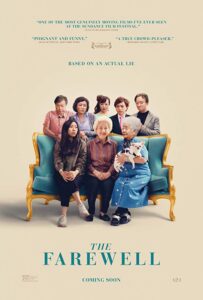Lulu Wang’s personal story becomes universal as we laugh and cry with her cinematic family


There was a moment while watching The Farewell when I noticed a tear on my cheek. I didn’t feel it coming, it just suddenly happened. Thirty seconds later the film had cut to a new scene, and I found myself laughing, just as involuntarily as I had just been crying.
Both the tear and the laughter came from the same place, a place stirred by the film but located deep within me. That is the experience of watching The Farewell.
Director Lulu Wang uses Awkwafina as a surrogate to tell an autobiographical story with a premise that Americans might find bizarre or cruel. And that’s largely the point.

Awkwafina plays Billi, a New York writer whose Nai Nai, Chinese for grandmother (Zhao Shuzhen), is diagnosed with terminal cancer. But the doctor communicates that diagnosis to Nai Nai’s sister (Lu Hong). She shares the diagnosis with Nai Nai’s family, all of whom agree not to tell her she has very little time to live.
Instead, it is decided that Billi’s cousin (Han Chen) will marry his Japanese girlfriend (Aoi Mizuhara), and the family will use the wedding as an excuse to return to China and spend time with Nai Nai while they can. All while continuing to keep the diagnosis secret from her.
If withholding a terminal diagnosis seems cruel to you, that’s a fair opinion, but I assure you, that’s not how it plays out in the film. Billi and her entire family agonize over it, and their ambivalence is the film’s central conflict, which is really an array of conflicts.
Wang based this story on her real family’s decision not to tell her Nai Nai about the same diagnosis. Even the wedding is based in fact. Handling the impending death of an elder like this is a practice rooted in Chinese cultural norms.
It’s difficult to write about this film because the descriptors we reviewers usually use are, for the most part, inaccurate and don’t do justice to a film that defies so many categories and accomplishes so many different things.
Labeling it a “comedy drama” I suppose is necessary, but don’t mistake this for the kinds of movies commonly described this way. This isn’t a throwaway comedy with a romantic subplot only there to give it the minimum required emotional weight.
The Farewell is an artful, personal film whose outstanding writing, pitch-perfect performances, and insights into cultural differences and intergenerational relationships will provoke a range of emotions.
Yet it is also an entirely welcoming film that never plays like something only made for an art film audience. Everyone other than the extremely xenophobic will connect with The Farewell. And it is not a meditation on how to handle death. This is a joyful, heartwarming film.
The PG rating is misleading, too. Your children certainly could, and should, watch this, but the emotional scope, themes, and comedic sensibility are more similar to, say, Marriage Story than any “family” movie. It’s very much like David Lynch’s underrated masterpiece The Straight Story in that respect. That film was rated G yet tells an adult story and captures something profound about American culture. The Farewell accomplishes the same thing, while also offering insights into Chinese culture, the experience of living on the margins between cultures, and the meaning of home.
But to pigeonhole it as an “intercultural film” or to use any similarly academic language would be unfair. This one aims for the heart. Even its most profound moments spring from personal human experience, not from some intellectual attempt to make a point.
Billi’s family comes to feel like your own family, regardless of your cultural background. It’s not unlike the first time you saw The Godfather and fell in love with the Corleones.
It should be apparent from the comparisons I’m making that The Farewell isn’t just a good movie relative to other 2019 releases. This just might be a classic in the making. It won’t garner the kind of box office numbers that are deemed impressive in the Age of Digital Spandex, because sadly, an indie comedy/drama starring an entirely Asian cast, set in China and mostly in Mandarin, is a tough sell for mainstream (read: majority white) American audiences.
However, this film will have a long half-life as home video audiences find it and inevitably become attached to it.
Awards season should be kind to the film, too, if the world still makes any sense at all. Awkwafina and Wang are already being nominated for awards, and Zhao deserves much more attention than she is getting from American critics. She steals the movie, and that’s saying a lot because Awkwafina proves she is probably a better dramatic actor than comedic. Tzi Ma and Diana Lin are outstanding as Billi’s parents, and even Han Chen in a very small role as Billi’s cousin sneaks up on us with a few poignant notes in the third act.
Be warned, though: it’s called The Farewell for a reason, although not the reason you might expect. When the farewell moment arrives, if you’re anything like me it will leave you in an ugly cry. A satisfying, inspiring ugly cry that might provoke a phone call to a parent or grandparent.
